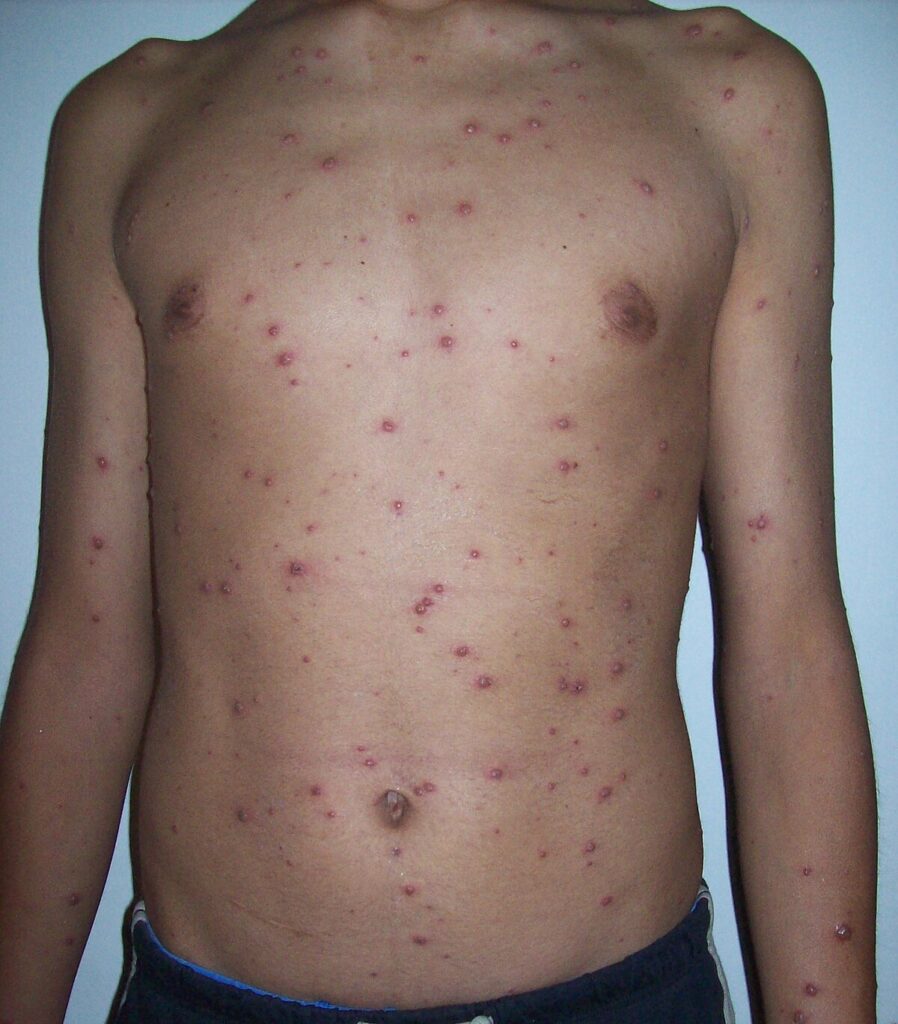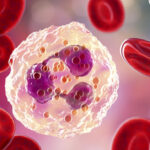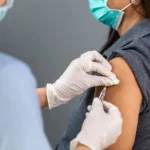Chickenpox, medically known as varicella, is a highly contagious disease caused by the varicella-zoster virus (VZV). It primarily affects children but can also occur in adults, particularly those who have not been vaccinated or exposed to the virus previously. This condition is characterized by an itchy rash, fever, and fatigue, and while generally mild, complications can arise in certain populations, such as pregnant individuals, newborns, and those with weakened immune systems.

Symptoms
The symptoms of chickenpox typically appear 10 to 21 days after exposure to the virus. These symptoms can vary in severity but commonly include:
- Initial Symptoms
- Fever
- Fatigue
- Loss of appetite
- Headache
- Development of Rash
- Stage 1: Macules – Small, flat red spots appearing on the skin.
- Stage 2: Papules – Raised bumps that develop after macules.
- Stage 3: Vesicles – Fluid-filled blisters that form on top of the papules.
- Stage 4: Crusting – The vesicles eventually burst and form scabs.
The rash typically begins on the chest, back, and face before spreading to other parts of the body, including the inside of the mouth and other mucous membranes.
How Chickenpox Spreads
Chickenpox is highly contagious and spreads through several routes:
- Direct Contact: Physical contact with the fluid from chickenpox blisters.
- Respiratory Droplets: Inhaling droplets from coughing or sneezing of an infected person.
- Contact with Contaminated Objects: Handling items such as clothing or bedding that have come into contact with the blisters.
Risk Factors
Certain groups are at higher risk of developing severe chickenpox:
- Unvaccinated individuals
- Pregnant women
- Newborns and infants
- People with weakened immune systems (e.g., due to chemotherapy or organ transplantation)
Complications
Generally mild, it can lead to serious complications, including:
- Bacterial Infections: Infected blisters due to scratching.
- Pneumonia: Particularly in adults and immunocompromised individuals.
- Encephalitis: Inflammation of the brain.
- Reye’s Syndrome: A rare but serious condition linked to aspirin use in children with viral infections.
- Shingles (Herpes Zoster): The varicella-zoster virus can reactivate later in life, causing a painful rash known as shingles.
Diagnosis
Chickenpox is typically diagnosed through clinical examination of the characteristic rash. In uncertain cases, laboratory tests, such as polymerase chain reaction (PCR) or direct fluorescent antibody (DFA) testing, may be used to confirm the diagnosis.
Treatment for Chickenpox
There is no specific cure for chickenpox, but treatments aim to relieve symptoms and prevent complications:
- Home Remedies
- Calamine Lotion: To soothe itching.
- Cool Baths: Adding oatmeal or baking soda to baths can provide relief.
- Hydration: Drinking plenty of fluids helps prevent dehydration.
- Medications
- Antihistamines: To alleviate itching.
- Antiviral Drugs: Acyclovir may be prescribed for high-risk individuals.
- Fever Management: Use acetaminophen (avoid aspirin to prevent Reye’s syndrome).
- Preventing Infection
- Avoid scratching blisters to reduce the risk of bacterial infections.
Preventing Chickenpox
The best way to prevent chickenpox is through vaccination. The chickenpox vaccine is a two-dose immunization recommended for children, adolescents, and adults who have not had the disease or been vaccinated previously.
- Who Should Get Vaccinated?
- Children: First dose at 12-15 months and a second dose at 4-6 years.
- Unvaccinated adolescents and adults: Two doses given 4-8 weeks apart.
- Other Preventive Measures
- Avoid close contact with infected individuals.
- Practice good hygiene, such as regular handwashing.
- Disinfect surfaces and objects that may harbor the virus.
Chickenpox and Pregnancy
Pregnant individuals who contract chickenpox are at higher risk of severe complications, including pneumonia and congenital varicella syndrome, which can affect the baby’s development. It is essential to consult a healthcare provider immediately if exposed during pregnancy.
Chickenpox vs. Shingles
Although caused by the same virus, chickenpox and shingles are distinct conditions:
| Feature | Chickenpox | Shingles |
|---|---|---|
| Age Group | Mostly children | Mostly adults over 50 |
| Symptoms | Itchy, widespread rash | Painful, localized rash |
| Cause | Primary infection with VZV | Reactivation of dormant VZV |
| Prevention | vaccine | Shingles vaccine |

